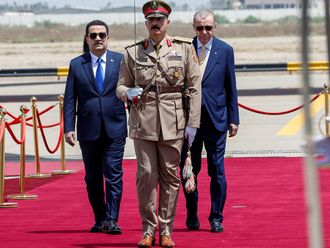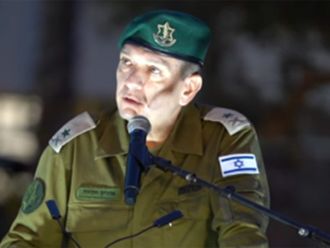Washington: The United States is ready to send around 600 troops to Iraq to train local forces for an upcoming offensive on Daesh stronghold of Mosul, US officials told AFP on Wednesday.
Daesh seized Mosul along with other areas in June 2014, but the country’s forces have since regained significant ground from the terrorists and are readying for a drive to retake Iraq’s second city.
Speaking on condition of anonymity ahead of a formal announcement, the officials said the troops would mainly be deployed to Qayyarah, a strategically vital air base south of Mosul that will help funnel supplies and troops toward the city.
US Defense Secretary Ashton Carter made the announcement Wednesday while on a work trip to Albuquerque, New Mexico.
“In consultation with the government of Iraq, the United States is prepared to provide additional US military personnel to train and advise the Iraqis as the planning for the Mosul campaign intensifies,” another US official said, again speaking on condition of anonymity.
A US-led coalition is carrying out air strikes against Daesh in Iraq, and Washington has authorised the deployment of more than 4,600 military personnel to the country.
Most are in advisory or training roles, working with Iraqi and Kurdish Peshmerga forces, but some American troops have fought Daesh on the ground, and three members of the US military have been killed by the terrorists in Iraq.
Earlier Wednesday, Prime Minister Haider Al Abadi’s office indicated it has requested “a final increase in the number of American trainers and advisers” to support Iraqi troops in the northern city.
The statement from Al Abadi’s office noted that American forces are helping Iraq in its battle against the terrorists, but their presence remains extremely politically sensitive due to the nine-year war the United States fought in the country.
The statement said the number of trainers and advisers would start to be reduced as soon as Mosul is retaken from Daesh, and also asserted that no American troops had fought alongside Iraqi troops.
In reality, American special forces have fought Daesh alongside Iraqi Kurdish forces on several occasions that have been made public, and likely in other operations that have not come to light.
Speaking in New Mexico on Tuesday, Carter said he expected the Mosul offensive to begin in the coming weeks, but stressed the decision was an Iraqi one.
“The plan is quite elaborate,” he said. “All of this is under the command of Prime Minister Al Abadi.”
The United Nations warned that military operations there could cause up to a million people to be displaced.
Last week, US President Barack Obama said US-backed Iraqi troops could be in a position “fairly rapidly” to liberate Mosul, though he warned “this is going to be hard, this is going to be challenging.”
Separately, the US military concluded Tuesday that a rocket fired earlier this month at the Qayyarah air base, which houses hundreds of US troops, contained no mustard agent, as initially suspected.
In neighboring Syria, hundreds of US forces are deployed alongside Kurdish and rebel fighters to battle Daesh, which is also facing air raids by the international coalition.
The Pentagon has expressed concern Daesh fighters could use mustard gas to defend Mosul.
Even after Mosul is retaken, the war against Daesh will be far from over.
The terrorists are likely to revert to insurgent tactics, such as bombings of civilians and hit-and-run attacks on security forces, following the demise of their “state” in Iraq.











